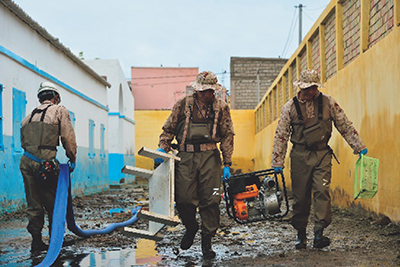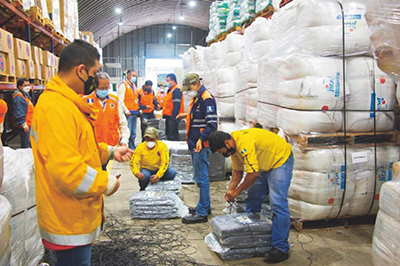(2) Humanitarian Assistance during Natural Disasters

The Japan Self-Defense Forces members carrying out water pumping and restoration works at primary and middle schools in Djibouti City, which was damaged by torrential rains and floods (Photo: Ministry of Defense) (See also “Stories from the Field”)

Emergency relief goods being handed over in Guatemala in response to hurricane damage in November 2020 (Photo: JICA)
Japan stands ready for the immediate provision of emergency assistance in response to requests from governments of affected countries or international organizations when large-scale disasters occur overseas. There are five types of Japan Disaster Relief (JDR) teams that provide humanitarian assistance: (i) “Search and Rescue Teams” to conduct search and rescue operations, (ii) “Medical Teams” to provide medical assistance, (iii) “Infectious Diseases Response Teams” to provide assistance to minimize the damage from infectious diseases, (iv) “Expert Teams” to give technical advice or guidance on emergency disaster mitigation activities and recovery operations (see “Project Introduction Column” regarding dispatch of JDR expert teams to Mauritius), and (v) “Self-Defense Force Units” to undertake medical activities and transportation of aid supplies and personnel when it is deemed particularly necessary in responding to large-scale disasters (see “Stories from the Field” for details). These teams are dispatched either individually or in combination.
Emergency relief goods are provided as in-kind assistance. Japan stockpiles tents, blankets, and other supplies needed for affected people in the immediate aftermath of a disaster in four overseas warehouses. In 2020, Japan provided emergency relief goods to the Philippines, Australia, Cambodia, Colombia, Fiji, Guatemala, Honduras, Lebanon, Nicaragua, Niger, Sudan, and Viet Nam, among other countries.
In addition, to relieve refugees, displaced persons, and others, and those who have been affected by natural disasters and/or conflicts overseas, Japan implements Emergency Grant Aid to the governments of affected countries as well as international organizations providing emergency assistance in affected areas. In many cases, Japanese NGOs contribute as implementing partners when these international organizations engage in actual emergency assistance.
Moreover, Japanese NGOs also provide various forms of assistance to those affected by disasters with ODA funds. Japan Platform (JPF), an emergency humanitarian aid organization established through the trilateral partnership and cooperation of Japanese NGOs, business communities, and the Government of Japan, provides assistance to refugees, displaced persons, or people affected by conflicts or natural disasters. The NGOs affiliated with JPF provide various forms of support for such people to meet their needs in regions that are often hard for local government aid to reach (see also “B. Cooperation with Japanese NGOs”).
Disaster response is a common concern of Japan and ASEAN, which are beset by numerous natural disasters. In order to strengthen the capacity of the ASEAN Coordinating Centre for Humanitarian Assistance on disaster management (AHA Centre), established in 2011, Japan has provided support for the establishment of an Integrated Information and Communication Technology System, capacity development, as well as the establishment and utilization of a Disaster Emergency Logistic System for ASEAN (DELSA) to rapidly transport emergency relief items to affected countries.
